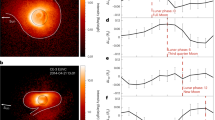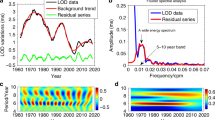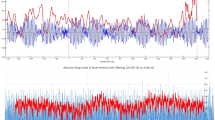Abstract
POLARISATION electric fields produced in the dynamo region should, theoretically, have a considerable effect on the distribution and energy of magnetospheric particles, but none has been found previously1–3. Here we show that the Dst index calculated by Sugiura and Poros4 shows a semidiurnal variation, which we attribute to the effect of tides (caused by the Moon) in the dynamo region, thus verifying the theory.
This is a preview of subscription content, access via your institution
Access options
Subscribe to this journal
Receive 51 print issues and online access
$199.00 per year
only $3.90 per issue
Buy this article
- Purchase on Springer Link
- Instant access to full article PDF
Prices may be subject to local taxes which are calculated during checkout
Similar content being viewed by others
References
Maeda, H., J. atmos. terr. Phys., 26, 1133–1138 (1964).
DeWitt, R. M., and Akasofu, S.-I., Planet. Space Sci., 13, 729–736 (1965).
Frank, L. A., Van Allen, J. A., and Craven, J. D., J. Geophys. Res., 69, 3155–3167 (1964).
Sugiura, M., and Poros, D. N., NASA Reports, X–645–71–278 (1971) and (1973).
Author information
Authors and Affiliations
Rights and permissions
About this article
Cite this article
KAMEI, T., MAEDA, H. Lunar effect in the quiet-time Dst index. Nature 259, 644–645 (1976). https://doi.org/10.1038/259644a0
Received:
Accepted:
Issue Date:
DOI: https://doi.org/10.1038/259644a0
Comments
By submitting a comment you agree to abide by our Terms and Community Guidelines. If you find something abusive or that does not comply with our terms or guidelines please flag it as inappropriate.



